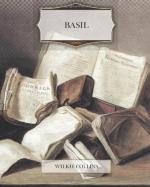One word more on the manner in which the purpose of the following pages is worked out—and I have done.
Nobody who admits that the business of fiction is to exhibit human life, can deny that scenes of misery and crime must of necessity, while human nature remains what it is, form part of that exhibition. Nobody can assert that such scenes are unproductive of useful results, when they are turned to a plainly and purely moral purpose. If I am asked why I have written certain scenes in this book, my answer is to be found in the universally-accepted truth which the preceding words express. I have a right to appeal to that truth; for I guided myself by it throughout. In deriving the lesson which the following pages contain, from those examples of error and crime which would most strikingly and naturally teach it, I determined to do justice to the honesty of my object by speaking out. In drawing the two characters, whose actions bring about the darker scenes of my story, I did not forget that it was my duty, while striving to portray them naturally, to put them to a good moral use; and at some sacrifice, in certain places, of dramatic effect (though I trust with no sacrifice of truth to Nature), I have shown the conduct of the vile, as always, in a greater or less degree, associated with something that is selfish, contemptible, or cruel in motive. Whether any of my better characters may succeed in endearing themselves to the reader, I know not: but this I do certainly know:—that I shall in no instance cheat him out of his sympathies in favour of the bad.
To those persons who dissent from the broad principles here adverted to; who deny that it is the novelist’s vocation to do more than merely amuse them; who shrink from all honest and serious reference, in books, to subjects which they think of in private and talk of in public everywhere; who see covert implications where nothing is implied, and improper allusions where nothing improper is alluded to; whose innocence is in the word, and not in the thought; whose morality stops at the tongue, and never gets on to the heart—to those persons, I should consider it loss of time, and worse, to offer any further explanation of my motives, than the sufficient explanation which I have given already. I do not address myself to them in this book, and shall never think of addressing myself to them in any other.
-----
Those words formed part of the original introduction to this novel. I wrote them nearly ten years since; and what I said then, I say now.
“Basil” was the second work of fiction which I produced. On its appearance, it was condemned off-hand, by a certain class of readers, as an outrage on their sense of propriety. Conscious of having designed and written, my story with the strictest regard to true delicacy, as distinguished from false—I allowed the prurient misinterpretation of certain perfectly innocent passages in this book to assert




